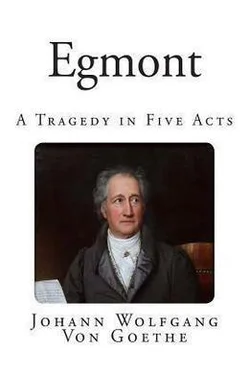Johann von Goethe - Egmont
Здесь есть возможность читать онлайн «Johann von Goethe - Egmont» весь текст электронной книги совершенно бесплатно (целиком полную версию без сокращений). В некоторых случаях можно слушать аудио, скачать через торрент в формате fb2 и присутствует краткое содержание. Год выпуска: 2015, Издательство: epubBooks Classics, Жанр: Драматургия, на английском языке. Описание произведения, (предисловие) а так же отзывы посетителей доступны на портале библиотеки ЛибКат.
- Название:Egmont
- Автор:
- Издательство:epubBooks Classics
- Жанр:
- Год:2015
- ISBN:нет данных
- Рейтинг книги:4 / 5. Голосов: 1
-
Избранное:Добавить в избранное
- Отзывы:
-
Ваша оценка:
- 80
- 1
- 2
- 3
- 4
- 5
Egmont: краткое содержание, описание и аннотация
Предлагаем к чтению аннотацию, описание, краткое содержание или предисловие (зависит от того, что написал сам автор книги «Egmont»). Если вы не нашли необходимую информацию о книге — напишите в комментариях, мы постараемся отыскать её.
Egmont — читать онлайн бесплатно полную книгу (весь текст) целиком
Ниже представлен текст книги, разбитый по страницам. Система сохранения места последней прочитанной страницы, позволяет с удобством читать онлайн бесплатно книгу «Egmont», без необходимости каждый раз заново искать на чём Вы остановились. Поставьте закладку, и сможете в любой момент перейти на страницу, на которой закончили чтение.
Интервал:
Закладка:
Soest. Here come the seven wise men of Greece.
Soapboiler. I know there are many who in secret hold with the Calvinists, abuse the bishops, and care not for the king. But a loyal subject, a sincere Catholic—!
(By degrees others join the speakers, and listen.)
[Enter Vansen.
Vansen. God save you, sirs! What news?
Carpenter. Have nothing to do with him, he's a dangerous fellow.
Jetter. Is he not secretary to Dr. Wiets?
Carpenter. He has already had several masters. First he was a clerk, and as one patron after another turned him off, on account of his roguish tricks, he now dabbles in the business of notary and advocate, and is a brandy–drinker to boot. (More people gather round and stand in groups.)
Vansen. So here you are, putting your heads together. Well, it is worth talking about.
Soest. I think so too.
Vansen. Now if only one of you had heart and another head enough for the work, we might break the Spanish fetters at once.
Soest. Sirs! you must not talk thus. We have taken our oath to the king.
Vansen. And the king to us. Mark that!
Jetter. There's sense in that? Tell us your opinion.
Others. Hearken to him; he's a clever fellow. He's sharp enough. I had an old master once, who possessed a collection of parchments, among which were charters of ancient constitutions, contracts, and privileges. He set great store, too, by the rarest books. One of these contained our whole constitution; how, at first, we Netherlanders had princes of our own, who governed according to hereditary laws, rights, and usages; how our ancestors paid due honour to their sovereign so long as he governed them equitably; and how they were immediately on their guard the moment he was for overstepping his bounds. The states were down upon him at once; for every province, however small, had its own chamber and representatives.
Carpenter. Hold your tongue! We knew that long ago! Every honest citizen learns as much about the constitution as he needs.
Jetter. Let him speak; one may always learn something.
Soest. He is quite right.
Several Citizens. Go on! Go on! One does not hear this every day.
Vansen. You citizens, forsooth! You live only in the present; and as you tamely follow the trade inherited from your fathers, so you let the government do with you just as it pleases. You make no inquiry into the origin, the history, or the rights of a Regent; and in consequence of this negligence, the Spaniard has drawn the net over your ears.
Soest. Who cares for that, if one has only daily bread?
Jetter. The devil! Why did not some one come forward and tell us this in time?
Vansen. I tell it you now. The King of Spain, whose good fortune it is to bear sway over these provinces, has no right to govern them otherwise than the petty princes who formerly possessed them separately. Do you understand that?
Jetter. Explain it to us.
Vansen. Why, it is as dear as the sun. Must you not be governed according to your provincial laws? How comes that?
A Citizen. Certainly!
Vansen. Has not the burgher of Brussels a different law from the burgher of Antwerp? The burgher of Antwerp from the burgher of Ghent? How comes that?
Another Citizen. By heavens!
Vansen. But if you let matters run on thus, they will soon tell you a different story. Fie on you! Philip, through a woman, now ventures to do what neither Charles the Bold, Frederick the Warrior, nor Charles the Fifth could accomplish.
Soest. Yes, yes! The old princes tried it also.
Vansen. Ay! But our ancestors kept a sharp look–out. If they thought themselves aggrieved by their sovereign, they would perhaps get his son and heir into their hands, detain him as a hostage, and surrender him only on the most favourable conditions. Our fathers were men! They knew their own interests! They knew how to lay hold on what they wanted, and to get it established! They were men of the right sort! and hence it is that our privileges are so dearly defined, our liberties so well secured.
Soest. What are you saying about our liberties?
All. Our liberties! our privileges! Tell us about our privileges.
Vansen. All the provinces have their peculiar advantages, but we of Brabant are the most splendidly provided for. I have read it all.
Soest. Say on.
Jetter. Let us hear.
A Citizen. Pray do.
Vansen. First, it stands written:—The Duke of Brabant shall be to us a good and faithful sovereign.
Soest. Good! Stands it so?
Jetter. Faithful? Is that true?
Vansen. As I tell you. He is bound to us as we are to him. Secondly: In the exercise of his authority he shall neither exert arbitrary power, nor exhibit caprice, himself, nor shall he, either directly or indirectly, sanction them in others.
Jetter. Bravo! Bravo! Not exert arbitrary power.
Soest. Nor exhibit caprice.
Another. And not sanction them in others! That is the main point. Not sanction them, either directly or indirectly.
Vansen. In express words.
Jetter. Get us the book.
A Citizen. Yes, we must see it.
Others. The book! The book!
Another. We will to the Regent with the book.
Another. Sir doctor, you shall be spokesman.
Soapboiler. Oh, the dolts!
Others. Something more out of the book!
Soapboiler. I'll knock his teeth down his throat if he says another word.
People. We'll see who dares to lay hands upon him. Tell us about our privileges! Have we any more privileges?
Vansen. Many, very good and very wholesome ones too. Thus it stands: The sovereign shall neither benefit the clergy, nor increase their number, without the consent of the nobles and of the states. Mark that! Nor shall he alter the constitution of the country.
Soest. Stands it so?
Vansen. I'll show it you, as it was written down two or three centuries ago.
A Citizen. And we tolerate the new bishops? The nobles must protect us, we will make a row else!
Others. And we suffer ourselves to be intimidated by the Inquisition?
Vansen. It is your own fault.
People. We have Egmont! We have Orange! They will protect our interests.
Vansen. Your brothers in Flanders are beginning the good work.
Soapboiler. Dog! (Strikes him.)
(Others oppose the Soapboiler, and exclaim,) Are you also a Spaniard?
Another. What! This honourable man?
Another. This learned man?
(They attack the Soapboiler.)
Carpenter. For heaven's sake, peace!
(Others mingle in the fray.)
Carpenter. Citizens, what means this?
(Boys whistle, throw stones, set on dogs; citizens stand and gape, people come running up, others walk quietly to and fro, others play all sorts of pranks, shout and huzza.)
Others. Freedom and privilege! Privilege and freedom!
[Enter Egmont, with followers.
Egmont. Peace! Peace! good people. What is the matter? Peace, I say! Separate them.
Carpenter. My good lord, you come like an angel from heaven. Hush! See you nothing? Count Egmont! Honour to Count Egmont!
Egmont. Here, too! What are you about? Burgher against burgher! Does not even the neighbourhood of our royal mistress oppose a barrier to this frenzy? Disperse yourselves, and go about your business. 'Tis a bad sign when you thus keep holiday on working days. How did the disturbance begin?
(The tumult gradually subsides, and the people gather around Egmont.)
Carpenter. They are fighting about their privileges.
Egmont. Which they will forfeit through their own folly,—and who are you? You seem honest people.
Carpenter. 'Tis our wish to be so.
Egmont. Your calling?
Carpenter. A Carpenter, and master of the guild.
Egmont. And you?
Soest. A shopkeeper.
Egmont. And you?
Jetter. A tailor.
Egmont. I remember, you were employed upon the liveries of my people. Your name is Jetter.
Читать дальшеИнтервал:
Закладка:
Похожие книги на «Egmont»
Представляем Вашему вниманию похожие книги на «Egmont» списком для выбора. Мы отобрали схожую по названию и смыслу литературу в надежде предоставить читателям больше вариантов отыскать новые, интересные, ещё непрочитанные произведения.
Обсуждение, отзывы о книге «Egmont» и просто собственные мнения читателей. Оставьте ваши комментарии, напишите, что Вы думаете о произведении, его смысле или главных героях. Укажите что конкретно понравилось, а что нет, и почему Вы так считаете.












